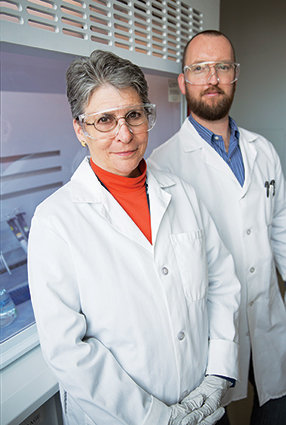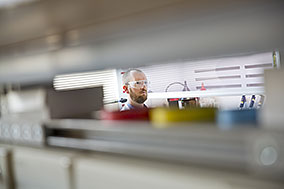
Unlikely collaborators
Research partnership yields prostate cancer biomarker
When the U.S. Department of Agriculture’s Agricultural Research Service put its Western Human Nutrition Research Center on the UC Davis campus some 13 years ago, no one could have predicted that the decision would eventually lead to the development of a biomarker for metastatic prostate cancer. But that’s exactly what happened, due to a sequence of events that began in 2007, recently culminating with the results of a new study from the UC Davis Comprehensive Cancer Center.
The study focuses on what is called “castration-resistant” prostate cancer, the point at which the disease does not respond to a treatment that deprives the patient of the male hormone testosterone, which fuels prostate cancer growth. The research validates preliminary findings in castration-resistant prostate cancer patients in which blood levels of proteins associated with bone turnover were found to be strongly associated with survival. Patients with high levels of these blood markers had a much shorter lifespan than those with low levels. However, and more importantly, patients with the highest marker levels — those with levels in the upper 25th percentile — appeared to preferentially benefit from an investigational bone-targeted therapy.
“The sooner the physician knows the level of this biomarker in the bloodstream, the sooner appropriate therapy can be provided, particularly for those who are destined to respond well,” says Western Human Nutrition Research Center research physiologist Marta Van Loan, a key investigator on the study.
In a step toward personalized medicine, these measurements could soon be used in a more precise manner to predict an individual patient’s response to a specific drug.
The Western Human Nutrition Research Center might at first seem like an unlikely partner for a prostate cancer study. It houses a dozen senior scientists conducting basic research on immunity, obesity and other nutrition-related topics. Among them is Van Loan, who, like the other scientists at the center, also holds an adjunct faculty position at UC Davis.
It was her expertise in bone metabolism that led to her participation in the research project. Six years ago, Primo “Lucky” Lara, associate director for translational research at the UC Davis Comprehensive Cancer Center, began asking his peers for referrals to a bone expert, and those queries led him over the causeway to Van Loan.
Lara had been conducting a pilot study of a novel prostate cancer drug (BMS275291) in development that was reported to affect bone health. He needed an expert to help him monitor each patient’s bone metabolism by measuring blood levels of proteins associated with bone turnover — that is, the body’s natural process of bone removal and regeneration. High turnover ultimately results in a net loss of bone tissue; prostate cancer treatment contributes to the loss of bone integrity, as androgen-deprivation therapy often causes abnormally low bone density.
And so began the collaboration. “It was coincidental that Lucky and I got together on this,” says Van Loan. “He asked if someone could assist, and he was referred to me.”
Though BMS275291 failed to help the approximately 80 participants, Lara, Van Loan and their colleagues did find that patients with low turnover — meaning lower levels of bone-resorption enzymes — tended to survive longer, and their disease was less likely to progress during the four-month study period. In contrast, patients with high bone markers — and therefore with higher bone turnover — had shorter survival times. In other words, the test could potentially predict who would respond to treatment and then help monitor the patient’s response to treatment.
“It was very exciting because we could — from one blood sample — predict which patients would be progression-free the longest,” explains Van Loan.
Starting in 2009, the approach was tested as part of a much larger clinical trial on patients whose prostate cancer is resistant to castration therapy and has spread to bone.
More than 1,000 prostate cancer patients were enrolled in the nationwide double-blind study of a new cancer therapy and of the bone marker test. That trial was conducted by SWOG, a national cancer cooperative group supported by the National Cancer Institute. All patients in that trial received standard-of-care chemotherapy. Half of the subjects also were given atrasentan, an experimental bone-targeted pill, while the other half received a matched placebo. Nearly 900 patients in the trial consented to having their bone marker levels monitored to determine if the bone health measures correlated with response and outcomes. Lara and Van Loan hypothesized that patients with high bone marker levels would preferentially benefit from a bone-targeted drug such as atrasentan.
Over nearly three years, chemist Erik Gertz and a cadre of UC Davis graduate and undergraduate students analyzed 4,000 blood samples from more than 800 patients in the study. Each sample was analyzed using four different tests with an instrument called a spectrophotometer. The instrument allowed the scientists to determine the extent to which each sample absorbed light. Higher absorbance rates correlated with bone marker concentrations in each sample.
Lara presented the final results of this study, which was funded by a National Cancer Institute grant, at the 2012 American Society of Clinical Oncology meeting. Although the trial did not show a benefit for atrasentan in the overall patient population, the bone marker studies were clearly positive. The findings of the earlier study had been confirmed: the survival benefit from atrasentan could be predicted by measuring blood levels of bone turnover. Importantly, it showed for the first time that bone markers have utility in helping select patients for appropriate bone-targeted treatment.
The investigational agent in that trial (atrasentan) is no longer under development in prostate cancer. But the bone marker story is just getting started: orteronel, a new drug that inhibits androgen production, is currently being tested in metastatic prostate cancer patients who are just initiating androgen deprivation therapy as part of a newly initiated Phase 3 SWOG trial. Together with other investigators, Lara is helping spearhead that trial and will again investigate the role of bone turnover biomarkers in this new patient population. He hopes that bone biomarkers in blood also will help predict which patients will benefit from a drug such as orteronel.
“This test could someday help us treat only those who are most likely to benefit from specific therapies,” Lara says. “That approach will obviously spare patients who are not destined to benefit from the side effects of ineffective therapy.”
He adds, “An unexpected side benefit is that these studies have led to a unique collaboration between the cancer center and the Department of Agriculture, showing that co-location of science centers can coalesce in a way that has beneficial applications for patients, even when all the researchers work in seemingly disparate fields.”


